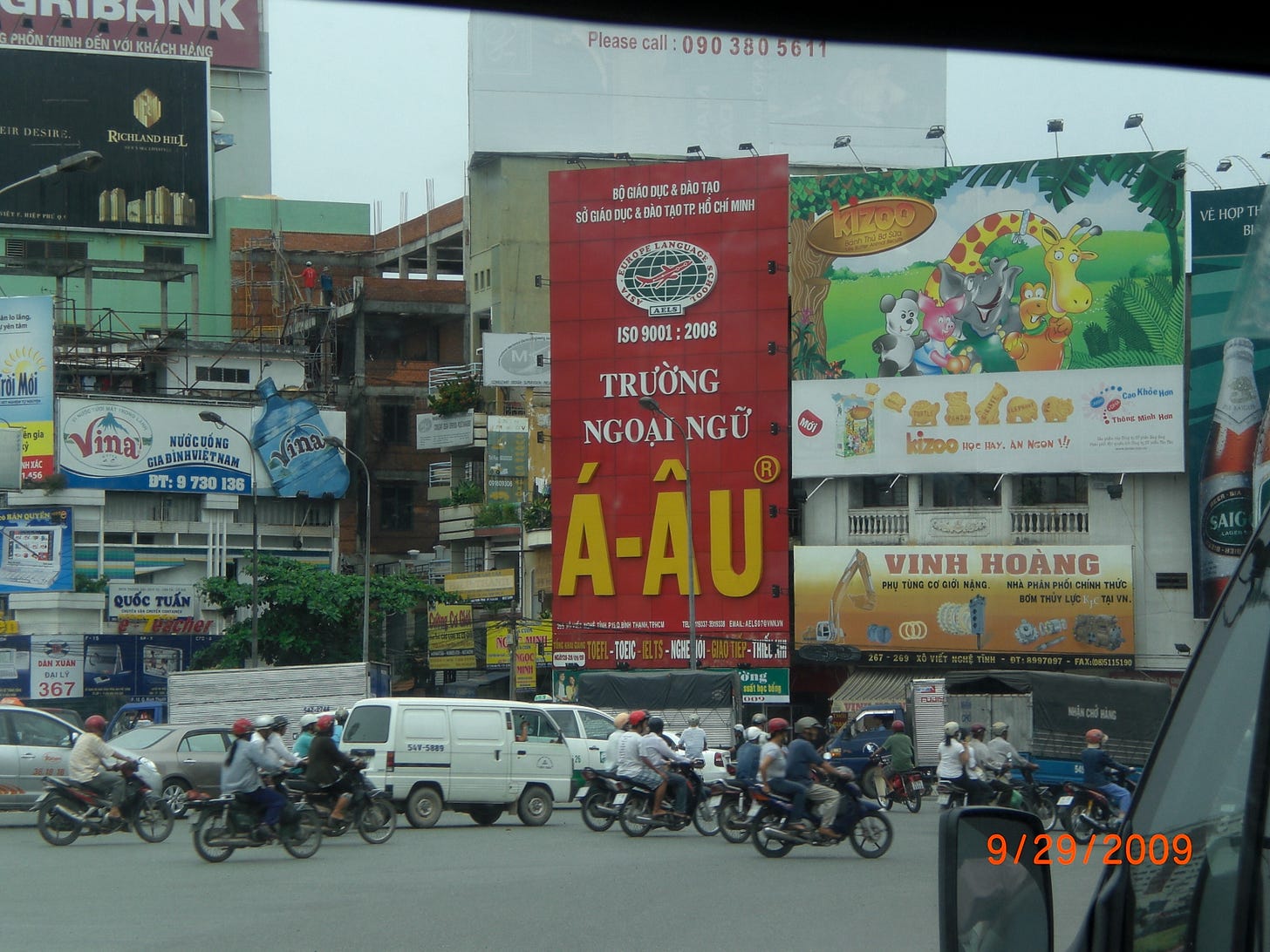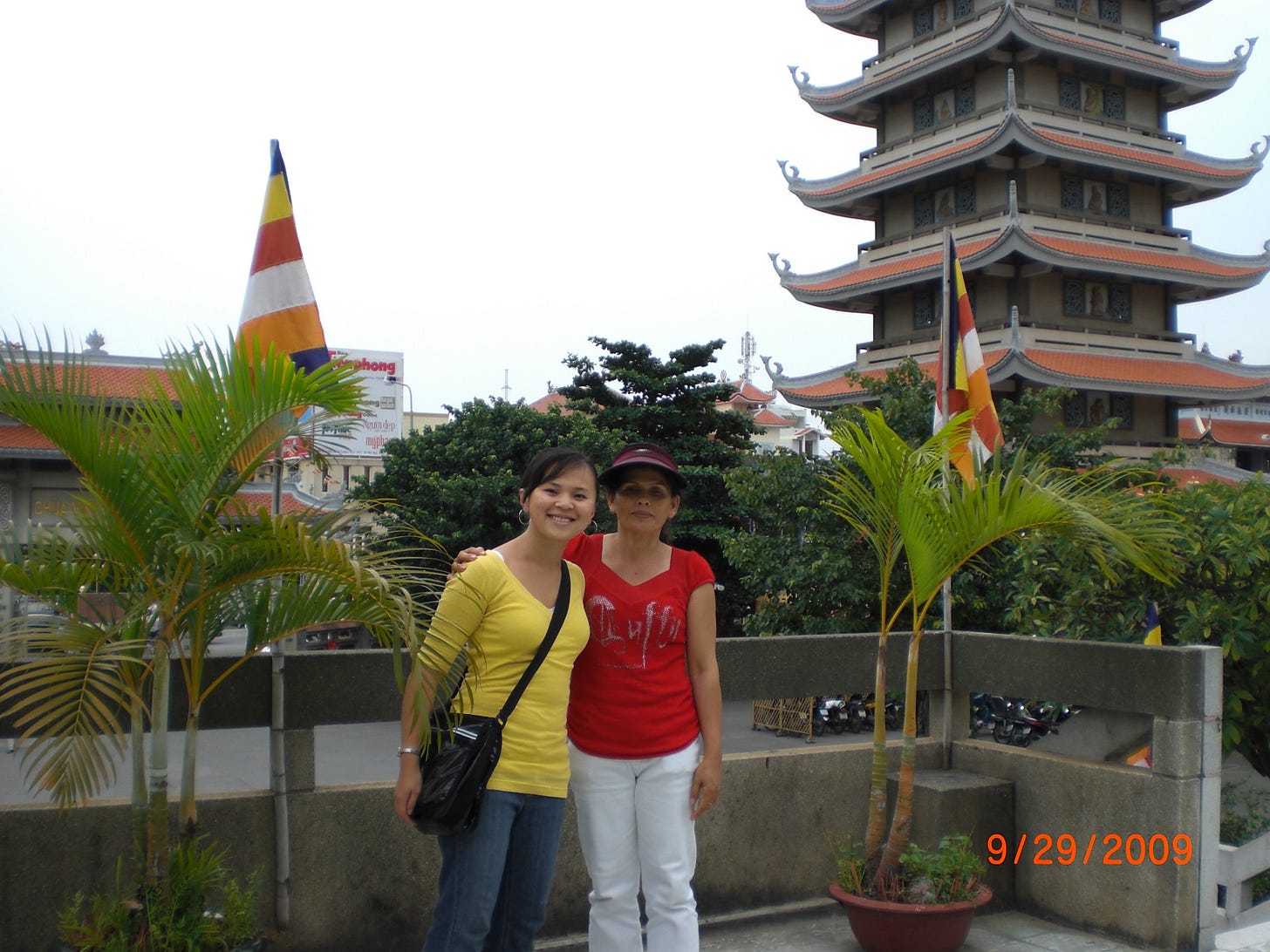On war, survival and privilege
I promise it’s not an oxymoron
Recently, while we were at the grocery store, my mom and I had a brief conversation about Vietnam, the country we came from.
I was trying to convince her to go back with me. Since leaving the country in 1995, I’ve only been back once, before I had kids, and she’s been back a few times. But she wasn’t entirely interested.
“What’s the point?” she said. “Almost everyone has left.”
By ‘everyone’ she means everyone in our immediate family—her siblings and in-laws (the ones who aren’t dead, that is)— my direct aunts, uncles, and cousins have left. Both sets of my grandparents are dead and buried in our village cemetery along with my dad.
I tried to think of someone in our family who’s still there. Finally, I came up with one person. One of my dad’s younger brothers, the one who bears the most resemblance to him.
“Uncle Tuan is still there, isn’t he?” I asked. Uncle Tuan has his own noodle factory.
“Yes, but…,” my mom replied. “There’s not much else.”
I get why my mom is uninterested in returning to a country where she spent four decades of her life, two of them in the midst of war. It’s not a pretty history. It’s the kind of memory that is best pushed in the back corners of your mind, never to be brought up again. It’s what humans do when we want to move on.
As the war is going on in Ukraine, I feel utterly helpless, and horrified for the people who are suffering, people who have no choice in the invasion of their country. I feel for them, but I also cannot feel for them. That’s because I had the privilege of being born a decade after the Vietnam War ended. So much of the country was on the rebound, and things were looking up.
Of course, it would take several more decades before Vietnam became the country it is today. When I visited in 2009, I was in my mid-twenties, and had been gone for over a decade by then, and there was still evidence of poverty, hunger, strife, and hopelessness. But it was also a beautiful experience, because I got to go on bus tours (scheduled by my brother and sister-in-law, who were still living there at the time) and we went all the way to the Central Highlands (we didn’t have time go to the north) where we saw buffaloes, cows, monkeys, geckos and all sorts of animals grazing the streets, living their life. We saw a lot of dirt roads. Some of them were bumpy. Our driver had no sense of direction so we were always in the middle of the road rather than on the right. We saw the most majestic green fields around—not rice paddies, mind you—but farms and evidence of agriculture, of growth. There was a semblance of a “jungle” deep in the valleys and there were people working, their backs hunched, with very little to live on except what they can grow on their own land.

We also saw Buddhist temples and war memorials and giant heated wells in theme parks and huge model airplanes and enormous statues of lions located in museums and hoards of people juggling things on their shoulders and backs, riding their motorbikes with their helmets on and carrying loads of cargo that clearly weighed more than the motorbikes themselves.
Of course, there was the noise. The cacophony of horns beeping, people talking (ahem, yelling) at the top of their lungs, slurping their soup, the children playing, and everyone laughing. Finally, we experienced the beauty of a Vietnamese beach and the exotic fruits and the live crabs and clams and fresh seafood and the reddest sand dune you could possibly imagine.

It is a very “busy” country where a lot of things are going on at the same time, where there is a juxtaposition of poverty and wealth, where you can see beauty and pain within the same vicinity. But that’s exactly what makes this country so enticing.
This sounds like a lot, but really—I was only there for about two weeks, and yet, I was not connected to its treacherous history.
Last week, I had the honor of being published by Oregon Humanities magazine an essay I wrote last year about my father—and my mother too, in that regard. Writing that essay was cathartic, and having it out there on the internet makes it even more special.
In the essay, I detailed the main events that occurred during my parents’ youth. How they lived in the same village, got married and how my dad decided to serve his country, how things went awfully wrong, and how my parents both suffered the consequences for many years because of it.
More often than not, we suffer the consequences of the decision we make ourselves, but in my parents’ case, it was beyond their control. And that’s what makes their story so powerful. I hope you’ll take some time to read the essay. It’s the inspiration for my book, and because the book spans a twenty-year saga, many of which involved the Vietnam War, I’ve been doing some deep research to better understand what happened.
So I watched the famous Ken Burns documentary aptly titled The Vietnam War, followed by its 611 page book companion. The documentary was very comprehensive, something I think everyone should watch if they want to understand the Vietnam War and most importantly, America’s relationship to it.
It made me cry. It made me think. Most importantly, it helped me understand so many things that my parents (and many Vietnamese people) don’t talk about.
While going through the book, I came upon a page that detailed a particular passage.
“Eight out of ten Americans in Vietnam never heard a shot fired in anger, never saw a bomb dropped or a village burned,” the page began. “They were the men in combat support and service support units—clerks, cooks, mechanics, MPs1 Furthermore, it said, “Private American contractors constructed one hundred airfields in South Vietnam…Long Binh, twenty miles north of Saigon, was the biggest of all American bases.”
Somehow this name sounded familiar to me. I began to wonder if there was a connection to my mom. So when we chatted a few weekends ago about going back to Vietnam, I began rattling off places that she’s probably never been to.
After rattling off places that I thought she hadn’t been to yet—places she could visit if she went back to me—I slyly inserted a name from the Ken Burns book: Long Binh.
“Yeah, I worked there for a few years,” she said nonchalantly, as if she’s folding laundry.
There it is! The proof that I was looking for.
When I was growing up, my mom would sometimes talk about what she did for work during the War. She didn’t talk about the specifics of war, other than to mention that she had to work to make ends meet. She would say that she used to “work for the Americans.” What does that mean, I wondered? And where exactly did she work?
But she was vague, unable to explain further.
Now I know that she worked at the biggest U.S. military base for enlisted support servicemen in Vietnam, a place called Long Binh, in the late sixties to early seventies, doing basic tasks like cooking, cleaning and upkeep. Now I know that most enlisted military professionals worked in a variety of support positions, and as a result, played a big role in employing thousands and thousands of Vietnamese people, thereby creating a lifelike in the midst of chaos and tragedy.
The thing about war reporting is that what we see and understand from the news and the media is the gritty stuff—the guns, the ammunition, the shooting, the injuries and deaths and all the horrible things that did occur during wars as the only thing that occurred during wars because it made for more seductive and emotionally fraught stories.
Vietnam is full of intensely proud people, people who are incredibly resilient and strong, and it makes me proud to come from this country. In this moment in time, I feel a sense of relief at knowing these things, if only to bring me closer to who I am.
Food (and non-food) bits
Where I’ve been published lately. In other words, shameless self-promotion 😀
I love hot sauces, as well as this crunchy snack.
For AAPI month, I wrote about four amazing (Asian American) female authors for BooknBrunch.com. Check out Traci Chee, Lyn Liao Butler, Roselle Lim2 and Mia P. Manansala. Don’t forget to grab a copy of their books too.
Have you read my profile on Madhushree Ghosh? She was great and her book about food & family was just as lovely. I talked briefly about her here.
Finally, go check out my Oregon Humanities essay.
In case you missed it…
Military police.
Shh don’t tell anyone, but she was my favorite person to talk to. She had such good wisdom.






Congratulations on having your essay published Hoang. I'm thrilled for you.
Congrats on the publication of your essay! I know I’ll enjoy it, as I do your other poignant, thoughtful and enlightened pieces about your family and Vietnam. You offer so many insights on this troubling chapter in American history through the lens of your personal experience. Always a fascinating read.